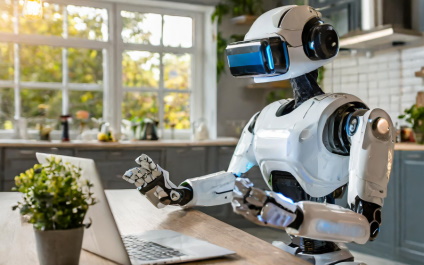Rapidly evolving technology is reshaping the world as we know it. Dubbed the Fourth Industrial Revolution, these exciting advances are transforming how we communicate, collaborate, create and innovate.
Let’s explore some of them:
1. AI
AI and Generative AI are not just buzzwords. They are transforming the workplace. These technologies enable automation, allow teams to be more efficient and thus free up human resources for more creative and strategic endeavours.
Artificial intelligence is now augmenting and automating various aspects of work including data analysis, customer service, image creation, product design and more.
On the flip side AI also poses significant challenges and risks. This includes ethical dilemmas, social implications, increased cybersecurity threats and workforce displacement. It is estimated that AI may displace about 85 million jobs by 2025 but it will create about 97 million new jobs.
Therefore, it is essential to adopt responsible and human-centric approaches to AI. Our teams need the relevant skills and support to adapt to the changing nature of work.
2. Remote Collaboration Tools
Advanced collaboration tools have facilitated the rise of remote work. These include video conferencing, project management software, and cloud-based document sharing platforms.
These tools empower teams to collaborate seamlessly across the world.
3. Hybrid Work Model
The hybrid work model describes the combination of remote and in-office work. This is not a new concept, but it has become more prevalent and acceptable post Covid.
The hybrid work model offers many benefits, such as:
- Increased productivity
- Reduced costs
- Improved work-life balance
- Enhanced employee satisfaction (immediate access to the fridge...mmm)
- Improved employee retention
The hybrid work model is transforming the way we work. It requires workers to have new skills, tools, and strategies. For example, hybrid work requires workers to have several capabilities to work effectively. These include strong digital literacy, communication, collaboration, and self-management skills.
4. Web3: The decentralised internet
Web3 is a term that refers to the next generation of the internet based on decentralised technologies, such as:
- Blockchain
- Cryptocurrencies
- Smart contracts
- Peer-to-peer networks
Web3 aims to create a more open, transparent, secure, and democratic internet, where users have more control over their own data, identity and digital assets.
It also enables new forms of collaboration and value creation including:
- Decentralised autonomous organisations (DAOs)
- Non-fungible tokens (NFTs)
- Decentralised finance (DeFi)
- Social tokens
Web3 is creating new business models, platforms and communities that are designed to be more inclusive, participatory and innovative.
It is estimated Web3 has the potential to generate $49.10 billion in economic value by 2030.
5. Internet of Things (IoT) in the workplace
IoT devices are creating smart and optimised workplaces. These ‘Things’ include smart thermostats that adjust office temperatures based on occupancy; wearable devices that track employees' health and productivity; printers and more. This connectivity enhances efficiency and reduces energy consumption. It also provides valuable data for informed decision-making.
6. Augmented Reality (AR) and Virtual Reality (VR)
AR and VR technologies are revolutionising training, design and customer interactions. In the workplace, AR and VR offer immersive training experiences that allow employees to learn complex tasks in a simulated environment. These technologies are also used in product design. This enables professionals to visualise and modify prototypes in real time which drives faster innovation cycles.
7. Cybersecurity advancements
As digital technologies advance so do cybersecurity threats. Businesses are investing in advanced cybersecurity measures to protect sensitive data.
These crucial measures include biometric authentication and AI-driven threat detection. They are essential in helping companies safeguard their digital assets and sensitive customer information.
The Impact on the future of work
These trends are here to stay and will keep evolving. Businesses that remain flexible and embrace these technologies gain the competitive edge.
Challenges and considerations
While these technologies are fascinating and bring immense benefits, they also pose challenges. Workforce training is essential to ensure employees can leverage these tools effectively and safely. Additionally, there are ethical considerations about data privacy and security. As well as the impact of automation on employment, as mentioned before.
Striking a balance between technological advancement and human welfare is crucial in this revolutionary era.
Symsafe can guide you successfully through your digital transformation
Navigating new technologies can be overwhelming but it doesn’t need to be. By working with Symsafe’s team of experts you can customise your transformation to fit your business goals and budget.
Chat to us today – 1300 002 001.

